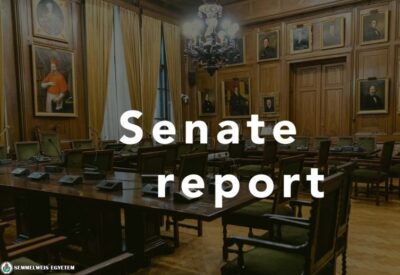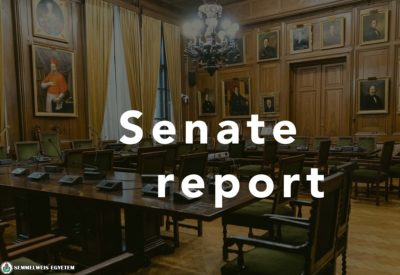The Senate voted to merge the doctoral schools. The measure was prompted by the need to unify and improve the efficiency of the doctoral training and degree awarding system, as well as to make administrative processes and quality control more efficient. According to the ruling, a joint Semmelweis University Doctoral School will be established from the academic year 2023/2024, which will continue to be managed by the Doctoral Council, while the current doctoral schools will continue to operate as chapters within the university.
A decision was taken to renew the members of the Habilitation Committee. This follows the amendment of the Habilitation Regulations, which were voted by the senators at their previous meeting in February 2023.
The Senate voted to amend certain management regulations. Pursuant to this, at the initiative of the Board of Trustees, an independent real estate estimate is required in all cases when real estate is sold or acquired – in practice, the university has acted accordingly so far. In the Commitment Rules, it has been introduced that the signature of the person making the commitment is valid and effective even if the document is signed during leave of absence. The change also provides for specific rules on the exercise of secondary legislation, the exercise of the commitment and the financial counter-signature during absence. It also clarifies some points of the Accounting Policy and the Valuation of Assets and Resources in the Book.
A new elective course, the Semmelweis International Vascular Symposium (SIVS), has been introduced. The event will take place from 18-20 May 2023, hosted by the Department of Vascular and Endovascular Surgery and the Frank J. Veith International Society. In order to increase student participation, attendance at the event will count towards the completion of two credit-bearing courses. Participation is recommended mainly for fourth, fifth and sixth year general medicine students, enrolled in block courses.
The senators voted in favour of the amendment to the Study and Examination Regulations (TVSZ), which was necessary due to the amendments to the Higher Education Act in December 2022. The change contains additions concerning the transposition of definitions and interpretative provisions. As part of this, the definition of language requirements has been included in the TVSZ among the elements of the model curriculum. The provision also reminds faculties that the model curricula should be revised in the light of the criteria set out in the ruling. The change affects the training and outcome requirements for the Master’s degree, teacher training, registration and digitization, and the policy on the storage and registration of theses. The TVSZ has also been amended regarding the procedure for the acceptance of elective subjects, which includes the arrangements for conferences, academic events and other voluntary activities substituting a subject. The Senate decides on such twice a year, in May and October, on the basis of a pre-submitted list of optional subjects. In case an important event takes place between these two occasions, a request for an event may be submitted to the Senate by special request, subject to the rector’s authorization.
The composition of the Review Committee has changed.
It was voted to establish the Department of Interventional Gastroenterology, which will operate under the Department of Surgery, Transplantation and Gastroenterology (STéG). As a conservative discipline, gastroenterology is traditionally found in internal medicine clinics, but the reorganization of the university’s surgery clinic and the high degree of development of surgical-type manual tools and approaches justified the creation of such a unit at STéG. The Department of Interventional Gastroenterology will play an important role in postgraduate and graduate education as well as further training.
It was also agreed to create a Department of Musculoskeletal Radiology, attached to the Medical Imaging Clinic. The decision was motivated by the specialization in the field of medical imaging and the significant development of musculoskeletal radiological imaging in recent years. The group will be involved in both undergraduate and postgraduate education and training.
The curriculum of the Faculty of Dentistry (FOK) has been modified. According to this, the prerequisites for the first-year summer internship in Odontotechnology have been abolished, which creates a more advantagous situation for students.
The Senate also decided to launch a Master’s degree in public health. So far, the Faculty of Health Sciences (ETK) has only offered BSc-level public health inspector training, while at the University of Debrecen and the University of Pécs, MSc-level training was available as well. The 3-semester, 90-credit correspondence course starts at Semmelweis University in two specializations: environmental and occupational health, and epidemiology.
Reports on the work of the standing faculty committees established by the Senate, namely the Examination and Studies Committee, the Credit Transfer Committee, the Ethical and Disciplinary Committee, and two additional committees regarding the András Pető Faculty, the Practical Training Committee, and the Publishing and Library Committee were acknowledged.
The senators also commented on a current management application, and under the miscallenous agenda item, Dr. Attila Szabó, Vice-Rector for Clinical Affairs, reported that the ambulance helicopter transport of patients has been restarted in the Central Patient Care Building of the Outer Clinical Block. Dr. Éva Szabó Feketéné, Vice-Rector for Strategy and Development, drew attention to the 50th anniversary of the Medic’s Cup, hosted by Semmelweis University.
Ádám Szabó
Translation: Viktória Kiss
Photo: Attila Kovács – Semmelweis University (illustration)


